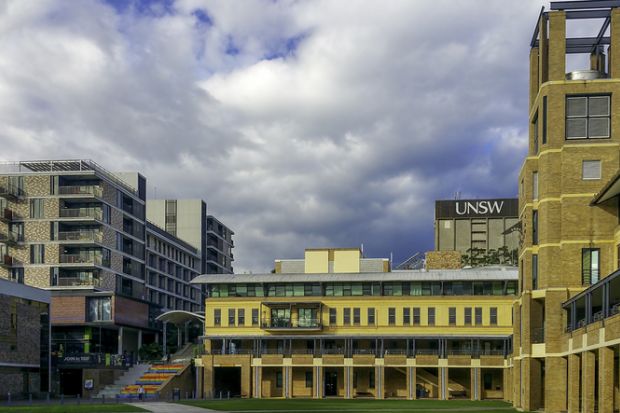One of Australia’s biggest universities will use Covid-19 as a springboard to accelerate its move into lifelong learning, as the pandemic claims nearly 500 jobs.
UNSW Sydney has announced plans to entrench lifelong learning as a “new chapter” in its history, while allowing staff and students to continue working remotely after the pandemic passes.
It says the maintenance of flexible work and study arrangements will boost its allure to staff while freeing up an estimated 22,000 square metres of lecture theatres and offices. Vice-chancellor Ian Jacobs said this would yield better space for “learning, socialising and recreation” and facilitate the transformation of the entire campus into an innovation hub.
“We will have community organisations, business and industry on campus working directly with our academics,” he said. “We are going to take advantage of the change in culture that this [crisis] has brought. Staff and students can be much more flexible in their hours and where they work. Almost all our staff want that flexibility, and previously the culture just didn’t allow it.”
The plans are outlined in a document charting “the next steps” of UNSW’s pandemic survival strategy. It says this year’s estimate of a A$600 million (£334 million) revenue drop turned out to be an overestimate, with the losses contained to between half and two-thirds of that figure because the decline in enrolments was not as steep as expected.
The university was able to accommodate the funding squeeze without cutting permanent positions, although it shed an undisclosed number of casual staff and contractors.
Professor Jacobs said next year would be worse, with UNSW forced to jettison the equivalent of 493 full-time positions – some 7.5 per cent of its workforce – to help compensate for an estimated A$370 million shortfall.
Professor Jacobs said the university would harness voluntary redundancies wherever possible “and if we can reduce them, we will – but at the moment that seems unlikely”.
UNSW will also reduce costs by relinquishing four senior leadership positions, contracting its eight divisions into six – by merging its research and enterprise arms, and its philanthropy and external relations sections – and overhauling its eight faculties.
Professor Jacobs said the new six-faculty structure was “much more suited” to the university’s grand challenges-style mission. “We have moved away from having one-school faculties, so we’ve got a better balance across the university.
“Our structure was put together in the 20th century based on what universities did in the 19th century. We now have a much more 21st-century model.”
He said that while the redundancies would be “painful”, there were “lots of positives” in the plans. “Changing structure is not something you want to do unless you have to, and in this situation we have an imperative to be more efficient. But we also need to be looking to the future and taking advantage of the opportunities this creates.”
Professor Jacobs said that while new online capabilities had been thrust on the university by necessity, they opened new doors in facilitating short courses for professionals and tailored training for companies, providing the opportunity “to really drive lifelong, flexible, module-based approaches to learning”.
“We have been developing that in a major way over the last two years, and now is the moment to take it forward. Insofar as anything can be exciting at the moment, that is really exciting.”
Register to continue
Why register?
- Registration is free and only takes a moment
- Once registered, you can read 3 articles a month
- Sign up for our newsletter
Subscribe
Or subscribe for unlimited access to:
- Unlimited access to news, views, insights & reviews
- Digital editions
- Digital access to THE’s university and college rankings analysis
Already registered or a current subscriber? Login










